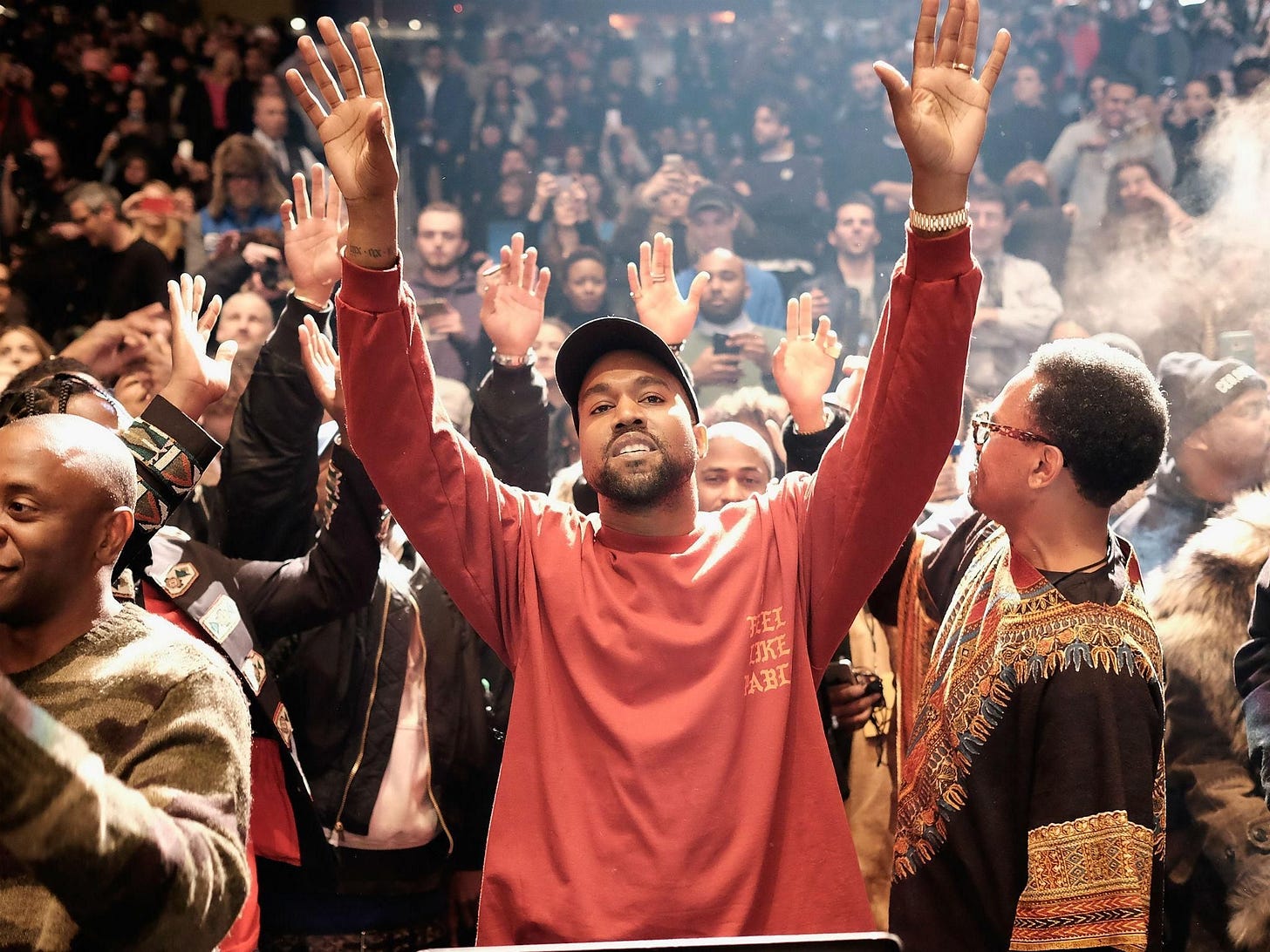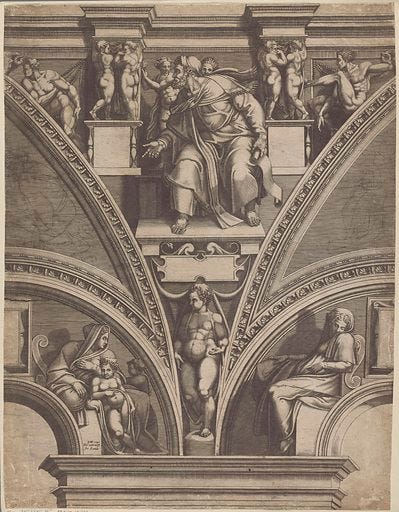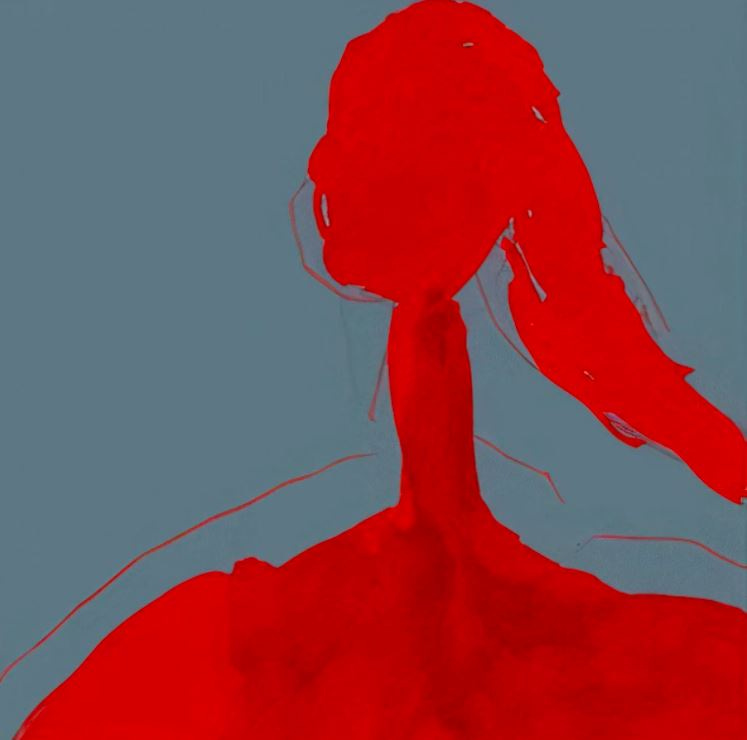
No fooling.
We’re not above scooting some crocodiles over and giving Yeezy a seat on the shelf.
In this Croc Bite, Noah David Elkins puts Christ-proclaiming, Wyoming ranch buying, rap artist and icon Kanye West, (legally, as of 2018, ‘Ye’) under the lens of the Holy Fool—a norm-flouting, truth-telling archetype in the tradition of Saint Paul, the prophet Ezekiel, and way out east, naked, freezing ascetics like Saint Basil.
But before that—and if you’re hot to trot on Kanye, scroll down until you see Noah’s name in the byline—some house cleaning; a few news items befitting a one year anniversary.
That’s right, humble readers.
It was about a year ago that an angsty, steam-blowing essay on the 2020 lockdowns and Watership Down kicked Shelf of Crocodiles off.
One year. Fourteen essays.
Sixty-seven subscribing readers, up from seven.
And this time next week—for both Noah, Ian Duncan, and yours truly—one M.F.A. degree from New Saint Andrews College.
*Takes a deep breath*
But first…
Word On the Pond
At the moment, and unlike a growing list of platforms that like to pull the plug on critics of the Politburo, Substack is, so far, a non-censoring.
Always a plus.
As a dutiful user, I should remind you that you can find a Substack App for iphone and ipad.If you’re reading, browsing newsletters, or even thinking of writing one, it’s a one stop shop.
If you’re an Android user, then you can join me on the waiting list and get notified when the Android version comes out.
As far as waiting lists go… the more, the merrier.
A Reader’s Survey
I’ve been speaking with a few of my wonderful readers in person, eliciting feedback I hope to use for future newsletters. As I won’t be able to meet with everyone, I’ve generated a short, anonymous reader’s survey with the goal of learning more about my readers, and seeing how their own feedback measures up against Substack’s posting data.
If you’ve enjoyed Shelf of Crocodiles, please do me a solid and make yourself heard.
My readership is growing.
With the goal of this remaining a free, monthly, longform publication that’s worth that time on every end, I’ve put on the tip jar on Ko-fi.com.
When you see this button…
You’ll know where to find it.
You can give as a one time ‘thank you,’ or you can strike up a monthly donation if you’re so inclined. If you have any questions about donations, feel free to DM me on Twitter or Instagram, or email at cmillcontent@gmail.com.
The crocodiles thank you.
For now, you can support Shelf of Crocodiles anytime by liking a newsletter, dropping a comment, sharing, quoting, or following the author @Crocodilereads on Twitter or Instagram.
Even in the age of metaverse, word of mouth is platinum.
While you’re at it, you can check out some of the other Substack Publications I read and follow:
The Upheaval by N.S. Lyons
Evangelical Re-formed by C.M. Lowery
Educator In Residence by Douglas Wilson
A Call for Betas
Last one, I promise. You’ll see this mentioned if you take the survey, so here’s a little more about it.
Along with keeping this publication up, I’ve written a novel.
A long one.
And while I’m coming up on a tidied, readable, but still nascent second draft, I’m interested if any subscribers might fancy reading some or all of it… and again, helping me with some brutally honest feedback.
In a nutshell, and to see if this piques your interest, it’s a meandering cross between 1984 dystopia, a Mad Max showdown and a redemption story—both for a nonbelieving individual and for California’s fractured political and geographic landscape.
My novel’s for adults. It stars a middle-aged civil servant who makes a mad dash from a future West Coast nation state in his rusted, emission spewing and highly illegal ‘83 VW Rabbit, all in the hope of finding a grown-up daughter who disappeared into the northeast wilderness a decade ago.
If you have any interest in being a beta, (or just hearing what that’s about), DM or give a shout at cmillcontent@gmail.com
No pressure.
Some Background on the Holy Fool
In short, and in the outdoorsy style of John the Baptist, a Holy Fool reorients an upside down world by making a scene.
Idols topple, the powerful and complacent blush with rage, and the obvious truth no one wants to hear bounces from megaphone… and in the end, minds and hearts tilt upward from a corrupt world to God and his Kingdom.
Skipping forward—and if we swap out poverty and eating bread baked over cow dung for glitterati opulence—Jonathan Pageau puts Kanye West in this tradition, insisting in his many YouTube lectures that ‘when the world the world is upside down, we need to pay attention to the fools.”

Mr. Ye’s Wild Ride
Pageau singles out Kanye as someone worth watching because for a long time, and in an increasingly decadent, identity-driven landscape, he took self-image and decadence as far as they could go.
Case in point:
-In 2007, the gaudy, catchy song ‘Good Life’ blows records out of the water.
-In 2009 at the MTV music awards, he grabs the mic from Taylor Swift.
-In 2013, he proclaims himself ‘Yeezus’, complete with a crown-of-thorns picture on the cover of Rolling Stone… and a music video of him on a motorcycle with Kim Kardashian, then his fiancée, topless.
-In 2014, and in a nuclear meltdown of media attention, he marries Kim Kardashian.
-In 2016, he checks into the UCLA medical center after a mental breakdown including hallucinations.
-In 2019, and donning a MAGA hat like ‘Superman’s cape’ Kanye steals the show from President Donald Trump and football legend Jim Brown at the oval office.
And here, Pageau suggests, having maxed out decadence, our fool pivots, taking positions that—not too long ago—no prominent, successful, culturally-savvy black celebrity would even think about:
He prefers Donald Trump to Hillary Clinton.
He defends the second amendment.
He suggests some comments he made years ago about politicians hating black people came from a ‘victimized’ mentality.
He shows enthusiasm, rather than sneering contempt for the United States, pointing to the then president and saying ‘If he looks good, then we look good.’
And in what might be the first viral moment of a celebrity echoing arguments made by Thomas Sowell for decades, he casually suggests that black Americans cling too strongly to the idea of racism—a comment he doubles down on in later interviews. When a reporter tries to nudge him back to mainstream orthodoxy on that topic, he shuts him down.
“I answered your question, I don’t speak in soundbites, you’re tasting a fine wine with multiple notes. You’re playing 4-D chess.”
-Kanye West
Of course, and as a Trump-era SNL sketch points out, he also rambles in circles about multiple dimensions, prison reform, education, Chiraq and his billion dollar stake in Adidas.
But the stumped expressions on reporters' faces say it all.
Who is this guy?
Through it all, and especially by 2019 with outdoor Sunday gatherings, appearances at Joel Osteen Houston’s megachurch, and his album Jesus is King, his flamboyant Christianity grows impossible to miss. When Jimmy Kimmel, in front of a packed auditorium, asks if he’s a Christian artist, Ye cracks a grin.
‘I’m a Christian everything.’
But the pendulum swing comes with whiplash.
Not long after throwing the MAGA hat away, Ye appears on the 2020 ballot as a presidential candidate for The Birthday Party in twelve states.
In February of 2021, Kim Kardashian divorces him, unspooling another thread of Twitter-fueled headlines and child custody drama.
Not exactly the same thing as freezing in the street or eating insects.
But considering how the disorderly, identity-fueled, instagrammable exuberance of the late 2010’s shriveled into lockdowns, airplane masking, one-way speech codes, and the still simmering racism witch hunt, Pageau’s notion of ‘paying attention to where the fool goes’ seems to have paid off.
If our culture, just like Weimar Germany in the 1930’s, swung from decadent anarchy to a harsh and frightening order, Kanye swung ahead of it. Fool that he is, you can argue that Ye’s return to the orderly structures of faith, church and gospel-music predated the yearning for obedience, order, normalcy.
As far as the capital T truth claims of Christianity go, is it possible that in his own dizzying, self-obsessed monodrama—and with words, as Ye reminds us, being an inferior form of communication—has the whole charade been one fantastic truth-telling?
To what extent is his faith honest, his repentance genuine, and in terms of what we see and hear occasionally, his madness shot through with method?
From here, it’s all Noah.
Hear Ye Out
by Noah David Elkins
In 2021, Kanye West (excuse me… Ye) released an album named Donda. His newest, Donda 2, came out a month ago.
Ye is an enigma and I think that makes him a perfect test case for learning not to judge people by their covers, no matter how bizarre that cover might be.
Like everyone else, you may know that Ye has an incredibly confusing life as well as an extremely complex celebrity persona. You might remember his early hit Heartless, and you’ve probably heard something about him embracing Christianity in 2019, with the release of his album, Jesus is King.
But you may not be aware of how deeply that faith has gone into him—or more importantly for our purposes, how gloriously it has come out in his music.
I’m not here to defend every recent run-in with Kim and Pete Davidson, or to give my own insight into his divorce. Rather, I want to turn to the aspect of Ye’s life that he does seem to have total control of.
His music.
If we take a look at his music we will find a lot more than what meets the eye.
But First… Two Assumptions
In his book Talking to Strangers, Malcolm Gladwell lays out two reasons that explain why we’re bad at understanding strangers.
Default to truth
Transparency
Default to truth is the mistake we make in constantly assuming that someone is being honest with us… and it becomes very complex when it comes to celebrity personalities.
Anyone who can remember the Taylor Swift vs. Kanye drama from a few years back will remember well how strange it is when a narrative we are told turns out to be a total fabrication.
Default to truth is something I believe Kanye is very aware of and that he uses to his advantage. He plays with perceptions, both of himself, and of his critics.
I’m not saying that Kanye is playing 9-dimensional chess.
Okay…I am kind of saying that.
Nowhere is this more clear than in his refusal to drop an album when he originally says he will drop it. He uses that expectation to create tension, controversy, and ultimately satisfaction when he ultimately releases the album—and at eleven of them so far, Ye’s no tease.
The second reason that Gladwell cites is what’s called transparency, which is our assumption that we can read into other people’s true motives purely by the way they present themselves to us.
We want to believe that we can read people’s true intent, even if it’s people that we’ve never met and who will never know our names. We create a persona around what kind of person we think they are, and we assume transparency… based on our assumptions about them.
Both default to truth and transparency are necessary mental shortcuts that all of us make, but they both lead us into making terrible mistakes if we take those default positions for too long.
We have to take these into account when considering celebrities like Kanye.
While it’s easy to assume that his recent conversion to Christianity is one hundred percent genuine, (transparency)—or, that it’s just another publicity stunt due to his chaotic, and very public nature, Ye’s persona goes far deeper than that.
Death and Resurrection
Donda, the name of his 2021 album, is also the name of Kanye’s mother who died back in 2007.
Up until now, Ye has not talked about his mother’s death at all. But in support of his claims to have become a Christian, the album’s lyrics and thematic movements give us some evidence that faith might be giving him the tools he needs to deal with her passing.

As far as I can tell, Donda has two movements:
Imprisonment
Prayer and Liberation
After the intro, the first song Jail begins the movement of Imprisonment. This theme is built on throughout the album as Ye talks about various types of imprisonment—guilt, broken relationships, death, as well as literal prison walls.
This comes through soundly on the bonus track Never Abandon Your Family, which may be the most heartbreaking song that Ye has ever produced.
The second movement begins around the song 24, which starts with a choir singing, Dear God make it alright/only you can make it alright—and by the end becomes a repeated call from Kanye to Know you’re alive and God’s not finished.
This movement ends with the last full song on the album Come to Life, which circles back to imprisonment: Uncle, now he’s back in the pen, but builds to a charismatic worship service with Kanye crying out over a triumphant piano ballad:
This is not about me, God is still alive, so I’m free/Floatin’ on a silver lining, floatin’ on a silver lining/So when I’m free, I’m free.
The end notes are forgiveness and liberation, ostensibly because of what God has accomplished in his life.
The Holy Fool
One concept that Malcolm Gladwell spends a little time on in Talking to Strangers is the concept of the Holy Fool. The Holy Fool is someone who, because of their chaotic persona, is able to get away with telling the truth when no one else can.
They say the Holy Fool was the only person in a king’s court who could tell the truth.
Comedians are the most obvious contemporary examples of this. Whether it’s Joe Rogan, Dave Chapelle, Bill Burr or Bo Burnham, we don’t go to comedians purely for their jokes. We go, or at least we went to them to hear what true things that no one else is willing to say.
Jonathan Pageau, who referred to Kanye West as a Holy Fool on his podcast several times, cites one example from a little over a year ago, when Ye went on Joe Rogan’s podcast and talked about anything and everything, from classical music to the Star Wars prequels. But at one point he spent a good bit of time explaining what expository preaching is to Joe Rogan.
Expository preaching. Just let that sink in.
All this is to say, Ye (along with everyone else) is far more complex than we might be led to believe. Without trying to justify everything he says and days, Ye’s hard-to-ignore journey reminds us of that art—even in it’s postmodern, individualistic flavor—can mirror our inner hopes, and reflect what we’re striving to be.
Running with that, I think Ye’s music is a beautiful testimony of what God is doing in his life.
Once again, this is not a defense of Ye’s recent behavior. But if his music is any indication of his inner life, then God—the one who begins a good work and then completes it— is sculpting something marvelous with Ye.
And in the best way, something foolish.
All this is to say, tabloids don’t tell the whole story. Maybe I’m too crazy for Yeezy, but I, for one, look forward to seeing what he does next.









This was a great, thought-provoking post! I learned a good deal from it, primarily that there is probably more to Ye's behavior than I've considered before.
Also, congrats to you, Ian, and Noah on your M.F.A. degrees!
In case anyone's reading (or re-reading this) now, in or past December of 2022, we're saddened and horrified to see Ye's descent into the rot of anti-Semitism.
Hot garbage that it is, we don't support it.
That being said, and while we might be compiling a few thoughts for a posted update, we're cautiously watching him to see what happens.
Having posted what we did, we're keeping the article up for now.
Our hope and prayer is that he surrounds himself with much healthier company, renounces his vile, accusations against the Jewish people, seeks the help he needs, and returns to what he does best: making music, designing clothing, and on some occasions, playing the loud contrarian to a mainstream culture gone completely mad.
What are your thought's on Ye's self-implosion?